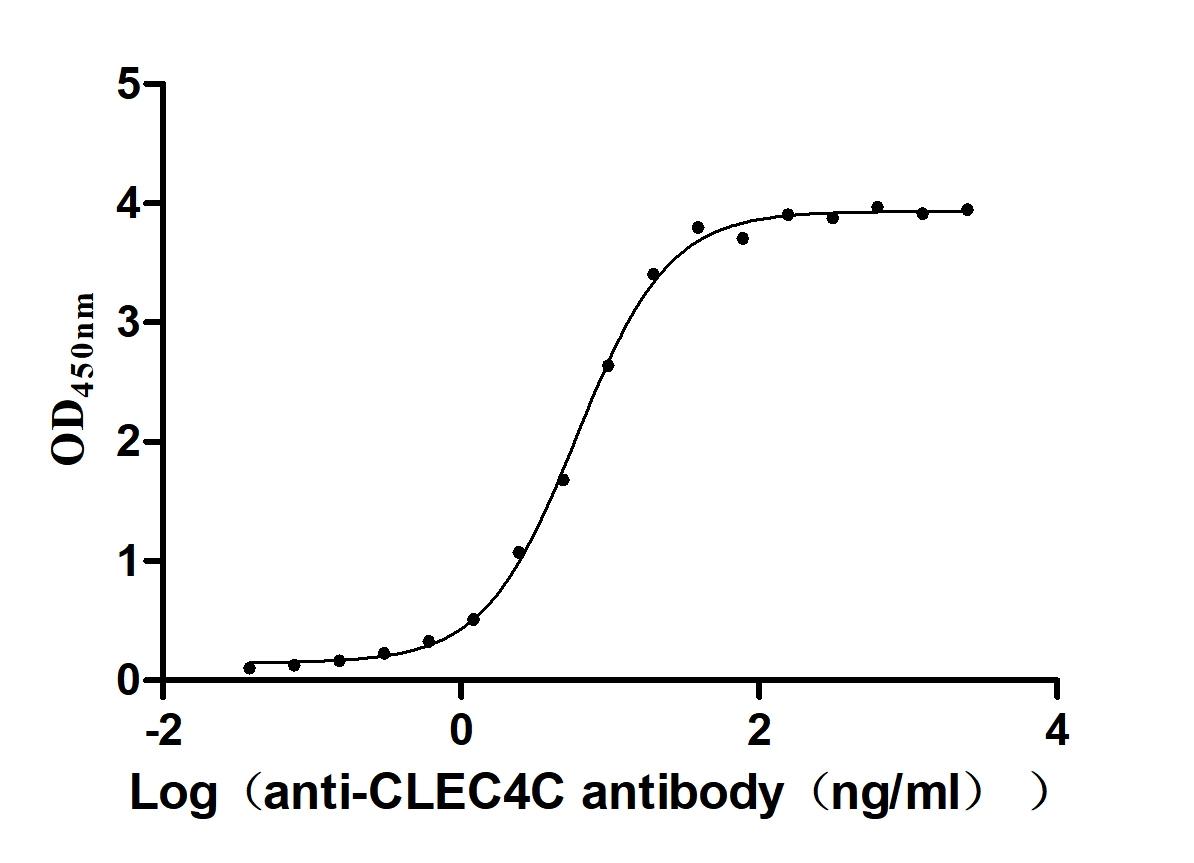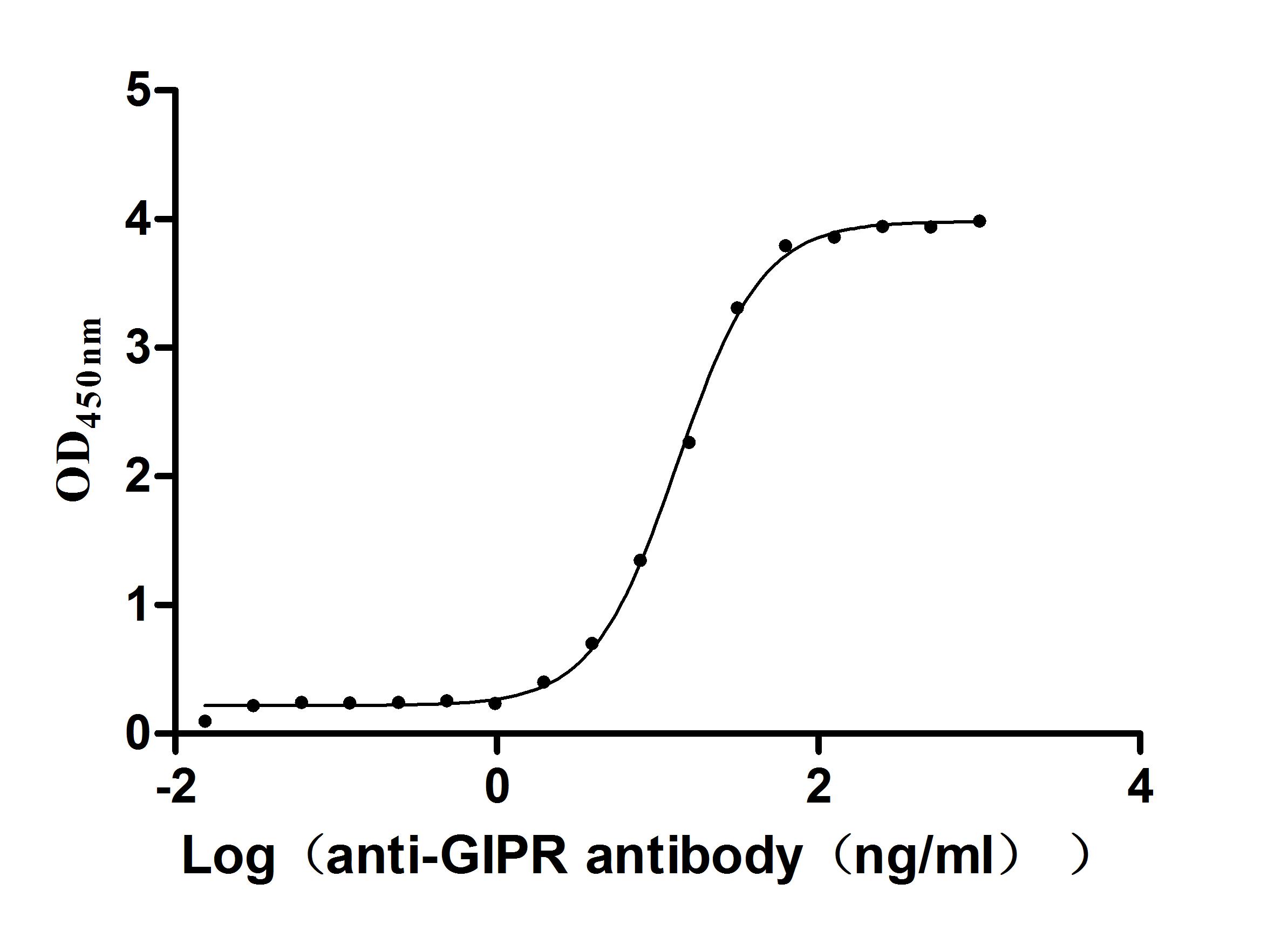Recombinant Human Serine protease hepsin (HPN), partial
-
货号:CSB-YP010704HU1
-
规格:
-
来源:Yeast
-
其他:
-
货号:CSB-EP010704HU1
-
规格:
-
来源:E.coli
-
其他:
-
货号:CSB-EP010704HU1-B
-
规格:
-
来源:E.coli
-
共轭:Avi-tag Biotinylated
E. coli biotin ligase (BirA) is highly specific in covalently attaching biotin to the 15 amino acid AviTag peptide. This recombinant protein was biotinylated in vivo by AviTag-BirA technology, which method is BriA catalyzes amide linkage between the biotin and the specific lysine of the AviTag.
-
其他:
-
货号:CSB-BP010704HU1
-
规格:
-
来源:Baculovirus
-
其他:
-
货号:CSB-MP010704HU1
-
规格:
-
来源:Mammalian cell
-
其他:
产品详情
-
纯度:>85% (SDS-PAGE)
-
基因名:HPN
-
Uniprot No.:
-
别名:HPN; TMPRSS1; Serine protease hepsin; Transmembrane protease serine 1
-
种属:Homo sapiens (Human)
-
蛋白长度:Partial
-
蛋白标签:Tag type will be determined during the manufacturing process.
The tag type will be determined during production process. If you have specified tag type, please tell us and we will develop the specified tag preferentially. -
产品提供形式:Lyophilized powder
Note: We will preferentially ship the format that we have in stock, however, if you have any special requirement for the format, please remark your requirement when placing the order, we will prepare according to your demand. -
复溶:We recommend that this vial be briefly centrifuged prior to opening to bring the contents to the bottom. Please reconstitute protein in deionized sterile water to a concentration of 0.1-1.0 mg/mL.We recommend to add 5-50% of glycerol (final concentration) and aliquot for long-term storage at -20℃/-80℃. Our default final concentration of glycerol is 50%. Customers could use it as reference.
-
储存条件:Store at -20°C/-80°C upon receipt, aliquoting is necessary for mutiple use. Avoid repeated freeze-thaw cycles.
-
保质期:The shelf life is related to many factors, storage state, buffer ingredients, storage temperature and the stability of the protein itself.
Generally, the shelf life of liquid form is 6 months at -20°C/-80°C. The shelf life of lyophilized form is 12 months at -20°C/-80°C. -
货期:Delivery time may differ from different purchasing way or location, please kindly consult your local distributors for specific delivery time.Note: All of our proteins are default shipped with normal blue ice packs, if you request to ship with dry ice, please communicate with us in advance and extra fees will be charged.
-
注意事项:Repeated freezing and thawing is not recommended. Store working aliquots at 4°C for up to one week.
-
Datasheet :Please contact us to get it.
相关产品
靶点详情
-
功能:Serine protease that cleaves extracellular substrates, and contributes to the proteolytic processing of growth factors, such as HGF and MST1/HGFL. Plays a role in cell growth and maintenance of cell morphology. Plays a role in the proteolytic processing of ACE2. Mediates the proteolytic cleavage of urinary UMOD that is required for UMOD polymerization.
-
基因功能参考文献:
- Study showed was that Hepsin was downregulated in 78% of gastric cancer. Its high expression seems to predict poor prognosis. These results predicted that hepsin protein expression was one of the significant and independent prognostic factors for overall survival of Gastric Cancer. PMID: 27841306
- Genetic variation in/near the gene encoding for hepsin protein may influence risk of bipolar disorder and (at least for the rs62122114-A allele) may have functional impact (i.e. differential expression) as evidenced by serum HPN protein expression. PMID: 28886448
- significant negative association was found between hepsin expression in endometrial carcinoma cases regarding the grade and the size of tumors as well as myometrial invasion PMID: 26990747
- These data demonstrate that the membrane-bound serine protease hepsin is the enzyme responsible for the physiological cleavage of uromodulin. PMID: 26673890
- The Hepsin pathway acts in concert with Wnt pathway to promote prostate cancer progression. PMID: 26139199
- Low expression levels of hepsin and TMPRSS3 are associated with poor breast cancer survival PMID: 26014348
- Hepsin suppressed CDK11p58 internal ribosome entry site activity in prostate cancer cells by modulating UNR expression and eIF-2alpha phosphorylation. PMID: 25576733
- The results of this study suggest that, in Korean men, some polymorphisms in the HPN gene might be associated with the risk of developing prostate cancer. PMID: 22665141
- hepsin expression is frequently up-regulated in breast cancer tissues, which is associated with tumor growth and progression PMID: 21383634
- These findings suggest that the MSP/RON signaling pathway may be regulated by hepsin in tissue homeostasis and in disease pathologies, such as in cancer and immune disorders. PMID: 21875933
- Elevated levels of hepsin interfere with cell adhesion and viability in the background of prostate cancer as well as other tissue types, the details of which depend on the microenvironment provided. PMID: 21750652
- Hepsin activity was inhibited by anthralin and increased by resveratrol. PMID: 20673210
- Germline genetic variation of HPN does not seem to contribute to risk of prostate cancer or prognosis. PMID: 20166135
- Hepsin activates prostasin and cleaves the extracellular domain of the epidermal growth factor receptor. PMID: 19911255
- Hepsin and maspin are inversely expressed in laser capture microdissectioned prostate cancer PMID: 12629351
- Hepsin is functionally linked to hepatocyte growth factor/MET pathway, which may contribute to prostate cancer progression. PMID: 15792801
- A major 11-locus haplotype is significantly associated with prostate cancer, which provides further support that HPN is a potentially important candidate gene involved in prostate cancer susceptibility. PMID: 16783571
- the ability of hepsin to efficiently activate pro-uPA suggests that it may initiate plasmin-mediated proteolytic pathways at the tumor/stroma interface that lead to basement membrane disruption and tumor progression PMID: 16908524
- Our findings suggest that the balance between hepsin and its inhibitor, HAI-2, may have prognostic value in RCC. PMID: 17309599
- We analyzed all the common variations using tag SNP in the HPN and LTBP4 genes for association with IA in 390 patients and 642 controls in the Dutch population. PMID: 18487557
- Hepsin showed potential inhibitory effects mediated by the induction of 14-3-3sigma expression which leads to both cell cycle arrest at the G2/M phase PMID: 18698500
- Ln-332 may be one mechanism by which hepsin promotes prostate tumor progression and metastasis, possibly by up-regulating prostate cancer cell motility. PMID: 18784072
显示更多
收起更多
-
亚细胞定位:Cell membrane; Single-pass type II membrane protein. Apical cell membrane; Single-pass type II membrane protein.
-
蛋白家族:Peptidase S1 family
-
组织特异性:Detected in liver and kidney.
-
数据库链接:
HGNC: 5155
OMIM: 142440
KEGG: hsa:3249
STRING: 9606.ENSP00000262626
UniGene: Hs.182385
Most popular with customers
-
Recombinant Human Tumor necrosis factor receptor superfamily member 8 (TNFRSF8), partial (Active)
Express system: Mammalian cell
Species: Homo sapiens (Human)
-
Recombinant Human Epithelial discoidin domain-containing receptor 1 (DDR1), partial (Active)
Express system: Mammalian cell
Species: Homo sapiens (Human)
-
Recombinant Human IL12B&IL12A Heterodimer Protein (Active)
Express system: Mammalian cell
Species: Homo sapiens (Human)
-
Recombinant Human Interleukin-17A (IL17A) (T26A) (Active)
Express system: Baculovirus
Species: Homo sapiens (Human)
-
Recombinant Macaca fascicularis C-type lectin domain family 4 member C(CLEC4C), partial (Active)
Express system: Mammalian cell
Species: Macaca fascicularis (Crab-eating macaque) (Cynomolgus monkey)
-
Recombinant Macaca Gastric inhibitory polypeptide receptor(GIPR), partial (Active)
Express system: yeast
Species: Macaca fascicularis (Crab-eating macaque) (Cynomolgus monkey)


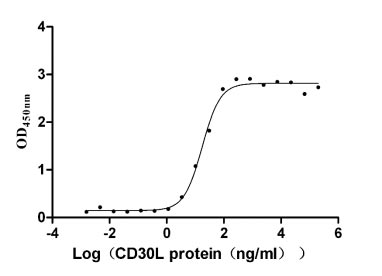
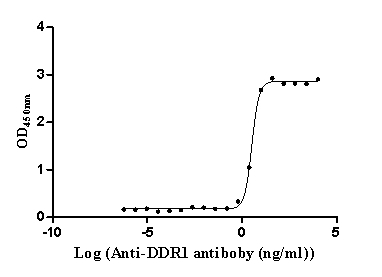
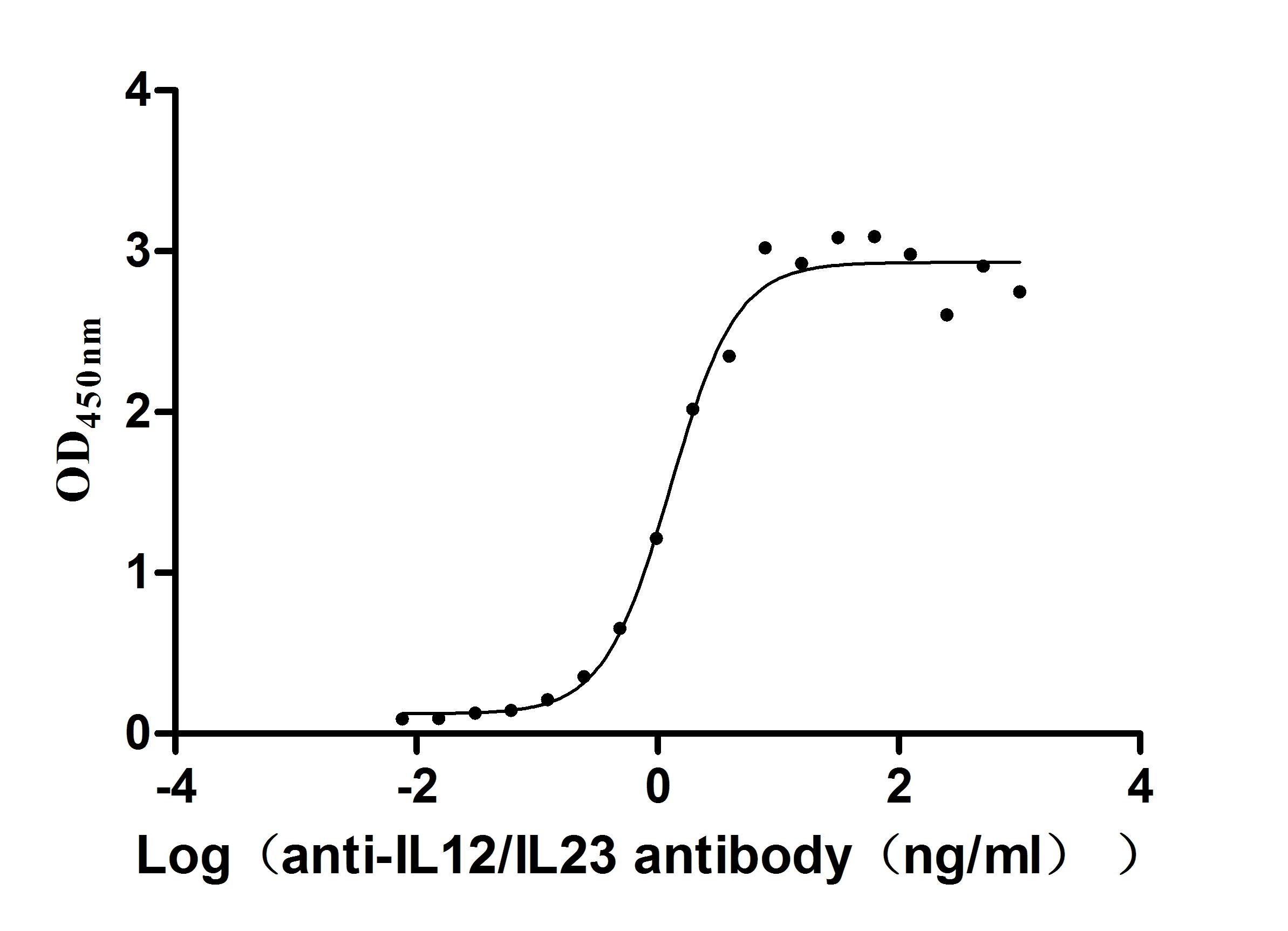
-AC1.jpg)
